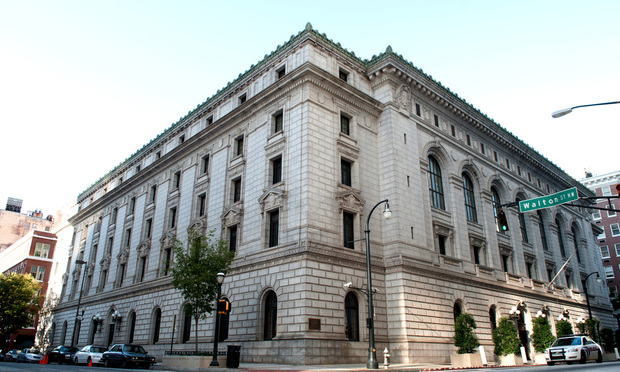With Threat of Coronavirus Looming, Eleventh Circuit Cancels Judicial Conference
Chief Judge Ed Carnes said that in the face of the evolving threat of the novel coronavirus, it was "necessary and prudent" to cancel the May judicial conference in Atlanta.
March 11, 2020 at 06:04 PM
3 minute read
 Elbert P. Tuttle Courthouse, U.S. Court of Appeals for the Eleventh Circuit, Atlanta. (Photo: Rebecca Breyer)
Elbert P. Tuttle Courthouse, U.S. Court of Appeals for the Eleventh Circuit, Atlanta. (Photo: Rebecca Breyer)
The evolving threat of the COVID-19 virus has prompted the U.S. Court of Appeals for the Eleventh Circuit to cancel its May judicial conference, Chief Judge Ed Carnes announced Wednesday.
The circuit's 2020 conference—which brings together federal judges from Georgia, Florida and Alabama, as well as lawyers who practice in the circuit—was scheduled to take place from May 6-9 in Atlanta. The Eleventh Circuit conferences are held biennially and generally qualify as continuing legal education credits for the attorneys and judges who attend.
Carnes said in a news release that he decided to cancel the conference given warnings by the Centers for Disease Control and Prevention and Georgia Gov. Brian Kemp that canceling the conference was "necessary and prudent in the interest of all those who would have attended."
Conferences in other industries have been canceled across the globe as well to mitigate the spread of COVID-19, also known as coronavirus.
Carnes said he hopes to reschedule the conference sometime in 2021, "if circumstances permit," given the importance of judicial conferences to the bench and the bar.
Carnes canceled the conference a day after the Supreme Court of Georgia issued a court order temporarily waiving the six-hour, in person continuing legal education requirement for active members of the State Bar of Georgia. The waiver is effective immediately and, for now, will remain in place through March 31. Bar members will still be required to complete the 12-hour CLE requirement but may do so through self-study, in-house, or online seminars.
Meanwhile, on Wednesday, the clerk's office of the Georgia Court of Appeals held an all-day drill with a skeleton staff to test its ability to continue court functions in an emergency.
Court clerk Steve Castlen said 35 people from the clerk's office and court administration worked remotely, leaving just three staff members in the courthouse. Castlen said that the appellate court has been preparing for several years to install technology that allows all the judges, their staff attorneys and administrative assistants to work remotely.
"As of today, every person in our office is able to work from home to accomplish every task needed to keep our systems running—except one," Castlen said Wednesday. "The one thing we cannot do from home is collect a paper filing from a pro se person who walks in with paper in hand, and hands it to one of us."
Castlen said that whether and how the court may conduct oral arguments is "something we are monitoring" and is under discussion by the en banc court. No oral arguments are scheduled for March, he said.
"Our term [of art] is 'continuity of operations' during an emergency no matter what it is," he Castlen added. "Coronavirus just happens to be the emergency we are dealing with today."
This content has been archived. It is available through our partners, LexisNexis® and Bloomberg Law.
To view this content, please continue to their sites.
Not a Lexis Subscriber?
Subscribe Now
Not a Bloomberg Law Subscriber?
Subscribe Now
NOT FOR REPRINT
© 2025 ALM Global, LLC, All Rights Reserved. Request academic re-use from www.copyright.com. All other uses, submit a request to [email protected]. For more information visit Asset & Logo Licensing.
You Might Like
View All
12-Partner Team 'Surprises' Atlanta Firm’s Leaders With Exit to Launch New Reed Smith Office
4 minute read
After Breakaway From FisherBroyles, Pierson Ferdinand Bills $75M in First Year
5 minute read
On the Move: Freeman Mathis & Gary Adds Florida Partners, Employment Pro Joins Jackson Lewis
6 minute readTrending Stories
Who Got The Work
J. Brugh Lower of Gibbons has entered an appearance for industrial equipment supplier Devco Corporation in a pending trademark infringement lawsuit. The suit, accusing the defendant of selling knock-off Graco products, was filed Dec. 18 in New Jersey District Court by Rivkin Radler on behalf of Graco Inc. and Graco Minnesota. The case, assigned to U.S. District Judge Zahid N. Quraishi, is 3:24-cv-11294, Graco Inc. et al v. Devco Corporation.
Who Got The Work
Rebecca Maller-Stein and Kent A. Yalowitz of Arnold & Porter Kaye Scholer have entered their appearances for Hanaco Venture Capital and its executives, Lior Prosor and David Frankel, in a pending securities lawsuit. The action, filed on Dec. 24 in New York Southern District Court by Zell, Aron & Co. on behalf of Goldeneye Advisors, accuses the defendants of negligently and fraudulently managing the plaintiff's $1 million investment. The case, assigned to U.S. District Judge Vernon S. Broderick, is 1:24-cv-09918, Goldeneye Advisors, LLC v. Hanaco Venture Capital, Ltd. et al.
Who Got The Work
Attorneys from A&O Shearman has stepped in as defense counsel for Toronto-Dominion Bank and other defendants in a pending securities class action. The suit, filed Dec. 11 in New York Southern District Court by Bleichmar Fonti & Auld, accuses the defendants of concealing the bank's 'pervasive' deficiencies in regards to its compliance with the Bank Secrecy Act and the quality of its anti-money laundering controls. The case, assigned to U.S. District Judge Arun Subramanian, is 1:24-cv-09445, Gonzalez v. The Toronto-Dominion Bank et al.
Who Got The Work
Crown Castle International, a Pennsylvania company providing shared communications infrastructure, has turned to Luke D. Wolf of Gordon Rees Scully Mansukhani to fend off a pending breach-of-contract lawsuit. The court action, filed Nov. 25 in Michigan Eastern District Court by Hooper Hathaway PC on behalf of The Town Residences LLC, accuses Crown Castle of failing to transfer approximately $30,000 in utility payments from T-Mobile in breach of a roof-top lease and assignment agreement. The case, assigned to U.S. District Judge Susan K. Declercq, is 2:24-cv-13131, The Town Residences LLC v. T-Mobile US, Inc. et al.
Who Got The Work
Wilfred P. Coronato and Daniel M. Schwartz of McCarter & English have stepped in as defense counsel to Electrolux Home Products Inc. in a pending product liability lawsuit. The court action, filed Nov. 26 in New York Eastern District Court by Poulos Lopiccolo PC and Nagel Rice LLP on behalf of David Stern, alleges that the defendant's refrigerators’ drawers and shelving repeatedly break and fall apart within months after purchase. The case, assigned to U.S. District Judge Joan M. Azrack, is 2:24-cv-08204, Stern v. Electrolux Home Products, Inc.
Featured Firms
Law Offices of Gary Martin Hays & Associates, P.C.
(470) 294-1674
Law Offices of Mark E. Salomone
(857) 444-6468
Smith & Hassler
(713) 739-1250







